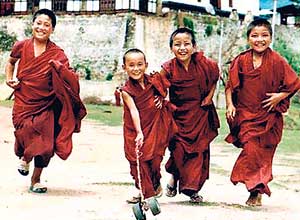NEW YORK - I have just returned from Bhutan, the Himalayan kingdom of unmatched natural beauty, cultural richness, and inspiring self-reflection. From the kingdom's uniqueness now arises a set of economic and social questions that are of pressing interest for the entire world.
Bhutan's rugged geography fostered the rise of a hardy population of farmers and herdsmen, and helped to foster a strong Buddhist culture, closely connected in history with Tibet. The population is sparse - roughly 700,000 people on territory the size of France - with agricultural communities nestled in deep valleys and a few herdsmen in the high mountains. Each valley is guarded by a dzong (fortress), which includes monasteries and temples, all dating back centuries and exhibiting a masterful combination of sophisticated architecture and fine arts.
 |
| Happy and young monks in Bhutan |
Bhutan's economy of agriculture and monastic life remained self-sufficient, poor, and isolated until recent decades, when a series of remarkable monarchs began to guide the country toward technological modernization (roads, power, modern health care, and education), international trade (notably with neighboring India), and political democracy. What is incredible is the thoughtfulness with which Bhutan is approaching this process of change, and how Buddhist thinking guides that thoughtfulness. Bhutan is asking itself the question that everyone must ask: how can economic modernization be combined with cultural robustness and social well-being?
In Bhutan, the economic challenge is not growth in gross national product, but in gross national happiness (GNH). I went to Bhutan to understand better how GNH is being applied. There is no formula, but, befitting the seriousness of the challenge and Bhutan's deep tradition of Buddhist reflection, there is an active and important process of national deliberation. Therein lies the inspiration for all of us.
Part of Bhutan's GNH revolves, of course, around meeting basic needs - improved health care, reduced maternal and child mortality, greater educational attainment, and better infrastructure, especially electricity, water, and sanitation. This focus on material improvement aimed at meeting basic needs makes sense for a country at Bhutan's relatively low income level.
Yet GNH goes well beyond broad-based, pro-poor growth. Bhutan is also asking how economic growth can be combined with environmental sustainability - a question that it has answered in part through a massive effort to protect the country's vast forest cover and its unique biodiversity. It is asking how it can preserve its traditional equality and foster its unique cultural heritage. And it is asking how individuals can maintain their psychological stability in an era of rapid change, marked by urbanization and an onslaught of global communication in a society that had no televisions until a decade ago.
I came to Bhutan after hearing an inspiring speech by Prime Minister Jigme Thinley at the 2010 Delhi Summit on Sustainable Development. Thinley had made two compelling points. The first concerned the environmental devastation that he could observe - including the retreat of glaciers and the loss of land cover - as he flew from Bhutan to India. The second was about the individual and the meaning of happiness. Thinley put it simply: We are each finite and fragile physical beings. How much "stuff" - fast foods, TV commercials, large cars, new gadgets, and latest fashions - can we stuff into ourselves without deranging our own psychological well-being?
For the world's poorest countries, such questions are not the most pressing. Their biggest and most compelling challenge is to meet citizens' basic needs. But, for more and more countries, Thinley's reflection on the ultimate sources of well-being is not only timely, but urgent.
Everybody knows how American-style hyper-consumerism can destabilize social relations and lead to aggressiveness, loneliness, greed, and over-work to the point of exhaustion. What is perhaps less recognized is how those trends have accelerated in the United States itself in recent decades. This may be the result of, among other things, the increasing and now relentless onslaught of advertising and public relations. The question of how to guide an economy to produce sustainable happiness - combining material well-being with human health, environmental conservation, and psychological and cultural resiliency - is one that needs addressing everywhere.
 |
| File photo: King Wangchuck trying to carry a child in the courtyard of Tashichhodzong Palace during a celebration. Reuters |
Bhutan has many things going its way. It will be able to increase exports of clean, run-of-the-river hydropower to India, thereby earning foreign exchange in a manner that is sustainable and that can fill government coffers to fund education, health care, and infrastructure. The country is also intent on ensuring that the benefits of growth reach all of the population, regardless of region or income level.
There are serious risks. Global climate change threatens Bhutan's ecology and economy. Incautious and expensive advice from McKinsey and other private consulting firms could help turn Bhutan into a degraded tourist zone. One must hope that the quest for GNH will help steer the country away from such temptations.
The key for Bhutan is to regard GNH as an enduring quest, rather than as a simple checklist. Bhutan's Buddhist tradition understands happiness not as attachment to goods and services, but as the result of the serious work of inner reflection and compassion toward others.
Bhutan has embarked on such a serious journey. The rest of the world's economies should do the same.
Jeffrey D. Sachs is Professor of Economics and Director of the Earth Institute at Columbia University. He is also Special Adviser to United Nations Secretary-General on the Millennium Development Goals.
Copyright: Project Syndicate, 2010. Exclusive to the Sunday Times |



